The Black Pyramid Of Amenemhat III – Mysterious Underground Chambers And Lost Ancient Treasures
Ellen Lloyd - AncientPages.com - The Black Pyramid, constructed under the reign of Amenemhat III, was initially erected as a monumental edifice that bore witness to the Pharaoh's magnificent grandeur.
Unfortunately, the pyramid, originally named Amenemhet is Mighty, has been looted and lost all its treasures. The pyramid got its name for its dark, decaying appearance as a rubble mound, and when archaeologists started to excavate at the site, the Black Pyramid was already in ruins.
Only some people today are aware of its existence. Even if the Black Pyramid is not as famous as the Giza pyramids, it is a fascinating ancient structure providing some historical knowledge about ancient Egypt.
Ancient Secrets Of The Black Pyramid Of Amenemhat III
Amenemhat III, Pharaoh of the Twelfth Dynasty of Egypt, planned to be buried inside the Black Pyramid with his queen.
The "Black Pyramid" of King Amenemhat III. Credit: Tekisch - CC BY-SA 3.0
Still, there were construction problems, and he abandoned the building project. Instead, he built a new pyramid at Hawara, near the Faiyum. The Black Pyramid at Dahshur became the final resting place for some royal women. It is still unknown who is buried inside the Black Pyramid.
The "Black Pyramid" of King Amenemhat III. Credit: Tekisch - CC BY-SA 3.0
When excavation of the Dashur Pyramid started in 1892, archaeologists made many exciting discoveries. Many of the pyramid's stones had been stolen and used to build houses in the village and surrounding areas. However, some of the remaining stones found in the vicinity and inside the pyramid "were inscribed with boat scenes and the like, in a style which showed clearly that they had originally belonged to Old Kingdom Mastabas; and it was clear that Amenemhat in constructing his pyramid "had quarried extensively among earlier tombs, possible in Medum or Dashur." 1
The Black Pyramid was initially about 75 meters tall, with a base 105 meters long.
In front of the entrance to the pyramid, there was a colossal "false door! In red granite 3,86 meters high, inscribed with the names and titles of Amenemhat. This must have been the offering steal which Amenemhat originally intended should be set up in the temple in connection with the granite altar." 1
False doors were quite popular in ancient Egypt. According to ancient Egyptian beliefs, these enigmatic doors led to the underworld beyond.
In ancient Egypt, the "false doors" also known as "Ka doors" allowed the Ka (an element of the "soul") to pass through them, and these carvings were typical in the mortuary temples and tombs of ancient Egypt from around the Third Dynasty and temples of the New Kingdom.
Pyramidion (capstone) at Egyptian Museum, Cairo. Credit: Public Domain
As previously explained on AncientPages.com, "In Egyptian beliefs, the soul had three parts, the Ka, the Ba, and the Akh. These three spiritual elements found refuge in the body. Therefore, it was vital to keep the body intact after death and to equip it with the necessary items for life.
Ka survived the death of the body and could reside in an image or statue of a person. It was bound to the body and represented its vital (hyper-powerful physical forces). This Ka, which thus exists forever, so that 'to go to it' is synonymous with 'to die' (or 'to be resurrected), is created, like man himself." 2
When archaeologists entered the causeway which led to the chambers, they discovered "several deep tomb-shaft were opened, one of which produced a finely executed head of a statue of a XIIth dynasty king, probably Amenemhat III, and a stela dedicated to a prince named Hapu (XXth dynasty?) and another finely colored block relief, representing a vulture and hawk with outstretched wings." 1
The most exciting finds were made in the lower part of the Black Pyramid, where scientists came across a vast network of underground passages. In these underground chambers, they found sarcophagus and canopic jars.
Ancient Egyptians believed death was a transition to another reality, and the heart was always left inside the mummified corpse for use in the afterlife.
"Canopic jars were ritual vessels containing internal organs removed from the body of the deceased during the mummification process." 3
Archaeologists found a sarcophagus inside the King's chamber, which was still well-preserved but did not contain the mummy of the Pharaoh. The Queens' section was in bad condition and had been looted. In addition, archaeologists found four other burial chambers in the underground section of the Black Pyramid. Two of the burials are believed to belong to King Amenemhet IV and Queen Sobekneferu. The other two remain unidentified.
Pharaoh Amenemhat III. Credit: EditorfromMars - CC BY-SA 4.0
The Black Pyramid has countless corridors and chambers underground. What ancient treasures were once hidden inside will remain a mystery because this interesting ancient site has been plundered.
Was There Also A Black Pyramid At Giza?
There are not many black pyramids in Egypt, but there may once have been one at Giza.
"The existence of a fourth pyramid at Giza was documented by Danish explorer Frederic Louis Norden (1708-1742), who participated in an expedition to Egypt organized by the Frenchman Pierre Joseph le Roux d'Esneval on demand by the Danish King Christian VI.
Norden was not an amateur explorer. He was an experienced naval Captain, cartographer, and archaeological explorer who, before he visited Egypt in 1737, had traveled to countries like the Netherlands, France, Italy, and Malta to study fortifications.
When Captain Norden reached Egypt, he documented and drew everything he saw and experienced, including pharaonic monuments, architecture, installations, and maps. He made more than 200 drawings that can be found in his publication Voyage d'Egypte et de Nubie.
Some of his drawings made modern researchers puzzled. Why had Captain Norden drawn a fourth pyramid at Giza?
In his writings, Captain Norden stated: "There are four of them; they deserve the attention of the curious, even though they may be seven or eight in the neighborhood, they are nothing in comparison with the first (…) The two pyramids to the north are the biggest and have 500 feet perpendicular. The other two are much smaller but have some peculiarities that cause them to be examined and admired."
Captain Norden said the ancient structure's top was significant when describing the fourth pyramid. It seemed to be "a stone blacker than the granite common." 4
The existence of a black pyramid at Giza has never been confirmed, but we do know the Black Pyramid at Dahshur is real even though it has been looted.
Written by Ellen Lloyd – AncientPages.com
Updated on February 12, 2024
Copyright © AncientPages.com All rights reserved. This material may not be published, broadcast, rewritten or redistributed in whole or part without the express written permission of AncientPages.com
Expand for references- C. M. (1908). The Egyptian Expedition: III. The Pyramid of Amenemhat. The Metropolitan Museum of Art Bulletin,3(10), 184-188
- Sutherland - Why Were Ba And Ka Powerful Elements Of Soul In Ancient Egyptian Beliefs?, AncientPages.com
- Sutherland - Canopic Jars: Funerary Tradition Of Ancient Egyptians And Their Beliefs In Afterlife, AncientPages.com
- Ellen Lloyd - Ancient Mystery Of Egypt's Black Pyramid – Did It Really Exist? AncientPages.com
More From Ancient Pages
-
 Enigmatic Footprints Reveal Humans Were In Spain 200,000 Years Earlier Than Previously Thought
Archaeology | Nov 11, 2022
Enigmatic Footprints Reveal Humans Were In Spain 200,000 Years Earlier Than Previously Thought
Archaeology | Nov 11, 2022 -
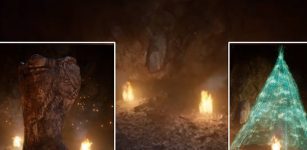 La Garma Cave Offers Evidence Of Over 300,000 Years Of Human Activity
Featured Stories | Dec 5, 2023
La Garma Cave Offers Evidence Of Over 300,000 Years Of Human Activity
Featured Stories | Dec 5, 2023 -
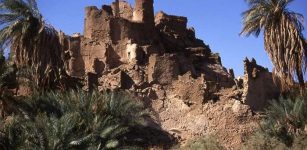 Mysterious Ancient Fortified City Of Djado On Dangerous Journey Across Sahara
Civilizations | Jun 4, 2023
Mysterious Ancient Fortified City Of Djado On Dangerous Journey Across Sahara
Civilizations | Jun 4, 2023 -
 Binary Code Was Used In Ancient India And Polynesia Long Before Leibnitz Invented It
Ancient Technology | Sep 28, 2017
Binary Code Was Used In Ancient India And Polynesia Long Before Leibnitz Invented It
Ancient Technology | Sep 28, 2017 -
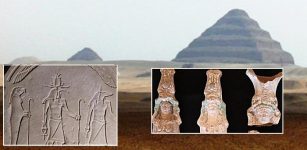 First Cemetery Dated To Roman Period Discovered In North Saqqara, Egypt
Archaeology | Nov 12, 2019
First Cemetery Dated To Roman Period Discovered In North Saqqara, Egypt
Archaeology | Nov 12, 2019 -
 Ancient Mysteries Of West Virginia: Did Ancient Celts Visit North America Where They Left An Ogham Inscribed Bone Needle With Christian Symbols?
Artifacts | Mar 1, 2017
Ancient Mysteries Of West Virginia: Did Ancient Celts Visit North America Where They Left An Ogham Inscribed Bone Needle With Christian Symbols?
Artifacts | Mar 1, 2017 -
 The Controversial History Of Moses – Who Was He Really?
Biblical Mysteries | Sep 13, 2015
The Controversial History Of Moses – Who Was He Really?
Biblical Mysteries | Sep 13, 2015 -
 Golden ‘Etruscan’ Orphic Book – Six Golden Pages Of The Oldest Book In History Of Mankind
Artifacts | Mar 27, 2020
Golden ‘Etruscan’ Orphic Book – Six Golden Pages Of The Oldest Book In History Of Mankind
Artifacts | Mar 27, 2020 -
 Mysterious Gold-Colored Chariot Washes Ashore In India – But Where Did It Come From?
News | May 12, 2022
Mysterious Gold-Colored Chariot Washes Ashore In India – But Where Did It Come From?
News | May 12, 2022 -
 Reconstructed Roman Gateway Tells The Story Of Britain’s Invasion
Featured Stories | Aug 26, 2023
Reconstructed Roman Gateway Tells The Story Of Britain’s Invasion
Featured Stories | Aug 26, 2023 -
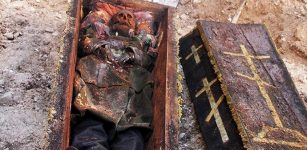 Dispute Between Russia And Poland Over Discovery Of Czarist Officer’s Corpse In Turkey
Archaeology | Apr 10, 2018
Dispute Between Russia And Poland Over Discovery Of Czarist Officer’s Corpse In Turkey
Archaeology | Apr 10, 2018 -
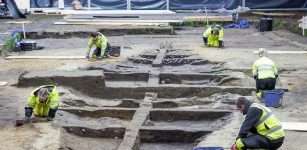 Reconstrucion Of The 19-Meter-Long Gjellestad Viking Ship In Progress
News | Oct 9, 2023
Reconstrucion Of The 19-Meter-Long Gjellestad Viking Ship In Progress
News | Oct 9, 2023 -
 Pandavleni Caves: Skillfully Carved Rocky Realms Decorated With Sculptures And Inscriptions In Brahmi Script
Featured Stories | Aug 1, 2016
Pandavleni Caves: Skillfully Carved Rocky Realms Decorated With Sculptures And Inscriptions In Brahmi Script
Featured Stories | Aug 1, 2016 -
 King Lud – Mysterious Founder Of London And His Connection To The Tuatha De Danann
Featured Stories | Oct 21, 2021
King Lud – Mysterious Founder Of London And His Connection To The Tuatha De Danann
Featured Stories | Oct 21, 2021 -
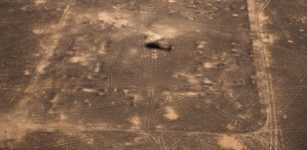 ‘Spectacular’ New Find: Roman Military Camps In Desert Found By Archaeologists Using Google Earth
Archaeology | Apr 27, 2023
‘Spectacular’ New Find: Roman Military Camps In Desert Found By Archaeologists Using Google Earth
Archaeology | Apr 27, 2023 -
 Long-Lost Wreck Of Crusader Ship And Gold Coins Discovered
Archaeology | Mar 14, 2017
Long-Lost Wreck Of Crusader Ship And Gold Coins Discovered
Archaeology | Mar 14, 2017 -
 Our 7-Day Week Can Be Traced To Babylonians Who Started Using It 4,000 Years Ago
Ancient History Facts | Nov 7, 2016
Our 7-Day Week Can Be Traced To Babylonians Who Started Using It 4,000 Years Ago
Ancient History Facts | Nov 7, 2016 -
 10 Great Ancient Mysteries Of Peru
Featured Stories | May 17, 2016
10 Great Ancient Mysteries Of Peru
Featured Stories | May 17, 2016 -
 Modern Humans Did Not Enter Europe By Sea – New Study Says
Archaeology | Mar 7, 2022
Modern Humans Did Not Enter Europe By Sea – New Study Says
Archaeology | Mar 7, 2022 -
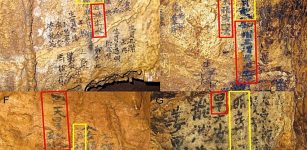 ‘Graffiti’ Found On The Walls Of Dayu Cave, China
News | Aug 25, 2015
‘Graffiti’ Found On The Walls Of Dayu Cave, China
News | Aug 25, 2015




